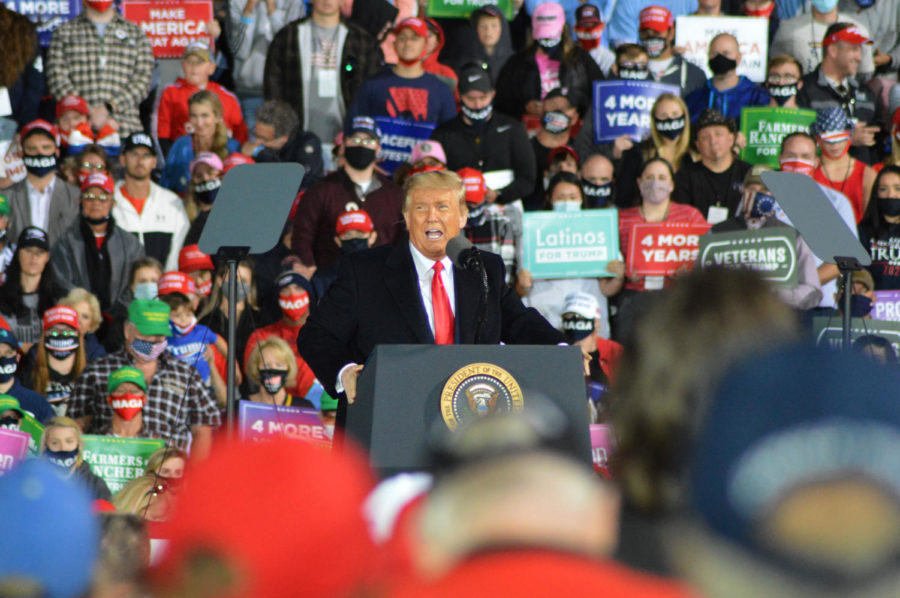Just as promised, House prosecutors present unseen footage from Capitol coup
President Donald Trump speaks to thousands of supporters at a rally Oct. 14 at the Des Moines International Airport.
February 10, 2021
Day two of impeachment trials: House prosecutors took senators back to the terrorizing halls of the U.S. Capitol after presenting unseen footage of the insurrection as evidence former President Donald Trump incited his supporters to storm the very building they will cast their vote in.
The Senate voted in favor of the constitutionality of the impeachment trial in a 56-44 vote Tuesday, allowing the process to proceed. Democratic prosecutors opened with an unseen video from the insurrection at the Capitol, linking Trump’s words with the actions of his followers.
The prosecution compiled footage of the rioters using force to breach the Capitol, overtaking police officers with force and killing Ashli Babbitt, who was a part of the riot. The 13-minute video also included Trump’s statements, which they argue lead to the insurrection. The Rotunda was still as members of both parties watched the disturbingly forthright video from Jan. 6.
“When you see all the pieces come together, just the total awareness of that, the enormity of this threat, not just to us as people, as lawmakers, but the threat to the institution and what Congress represents, it’s disturbing,” Sen. Lisa Murkowski, R-Ak., said. “Greatly disturbing.”
Led by Rep. Jamie Raskin, D-Md., the House impeachment managers referred to Trump as the “inciter-in-chief” of riots that resulted in the death of five people. Democrats argued Trump groomed his base as he encouraged false election rhetoric leading up to the election and after.
“You ask what a high crime and misdemeanor is under our Constitution,” Raskin said, referring to the video. “That’s a high crime and misdemeanor. If that’s not an impeachable offense, then there’s no such thing.”
At a rally leading up to the insurrection, Trump told his followers to “fight like hell” and to “stop the steal.” House Delegate of U.S. Virgin Islands Stacey Plaskett said the riots followed through on a mission Trump sent them on.
House prosecutor Joe Neguse, D-Co., referred to past public officials who were impeached after leaving office. Neguse reminded the Senate of their constitutional checks on the president: “removal from Office, and disqualification.”
Iowa Sen. Chuck Grassley voted against the proceeding with the trials Tuesday but said there is no connection on how he will vote on conviction.
“My skepticism is rooted in the argument around the constitutional text,” Grassley said during a press conference call. “Scholars and lawyers will certainly continue to argue the matter. With the vote [Tuesday], the Senate will move forward with a trial regardless, as I have in the past, I will do my duty sitting as a juror.”
Dirk Deam, teaching professor of political science, said an impeachment trial is not a criminal proceeding, it is a political process.
The Brandenburg v. Ohio ruling determined inflammatory speech intending to advocate illegal action is restricted speech in 1969 after a Ku Klux Klan leader held a rally of his Klansman. In his speech, he included a number of derogatory racial slurs while threatening the possibility of revenge, according to the Legal Information Institute. This case was put to the test in 1973 in Hess v. Indiana, also known as the Brandenburg test.
“Rules like this are perhaps relevant but have to be seen in the political context of impeachment,” Deam said. “Maybe the president didn’t strictly rise to these levels of the Brandenburg test, but maybe that doesn’t matter given what [happened] in a broader context and how that injured the republic.”
Deam said while the footage is hard to watch, it is also carefully edited to show the concurrence of what Trump was saying and what the mob was doing.
“As long as the charges are specified and there is evidence to support that, then you get a sense it is legitimate,” Deam said. “If it turns out the evidence itself is very emotional or provokes strong emotions, tough.”







